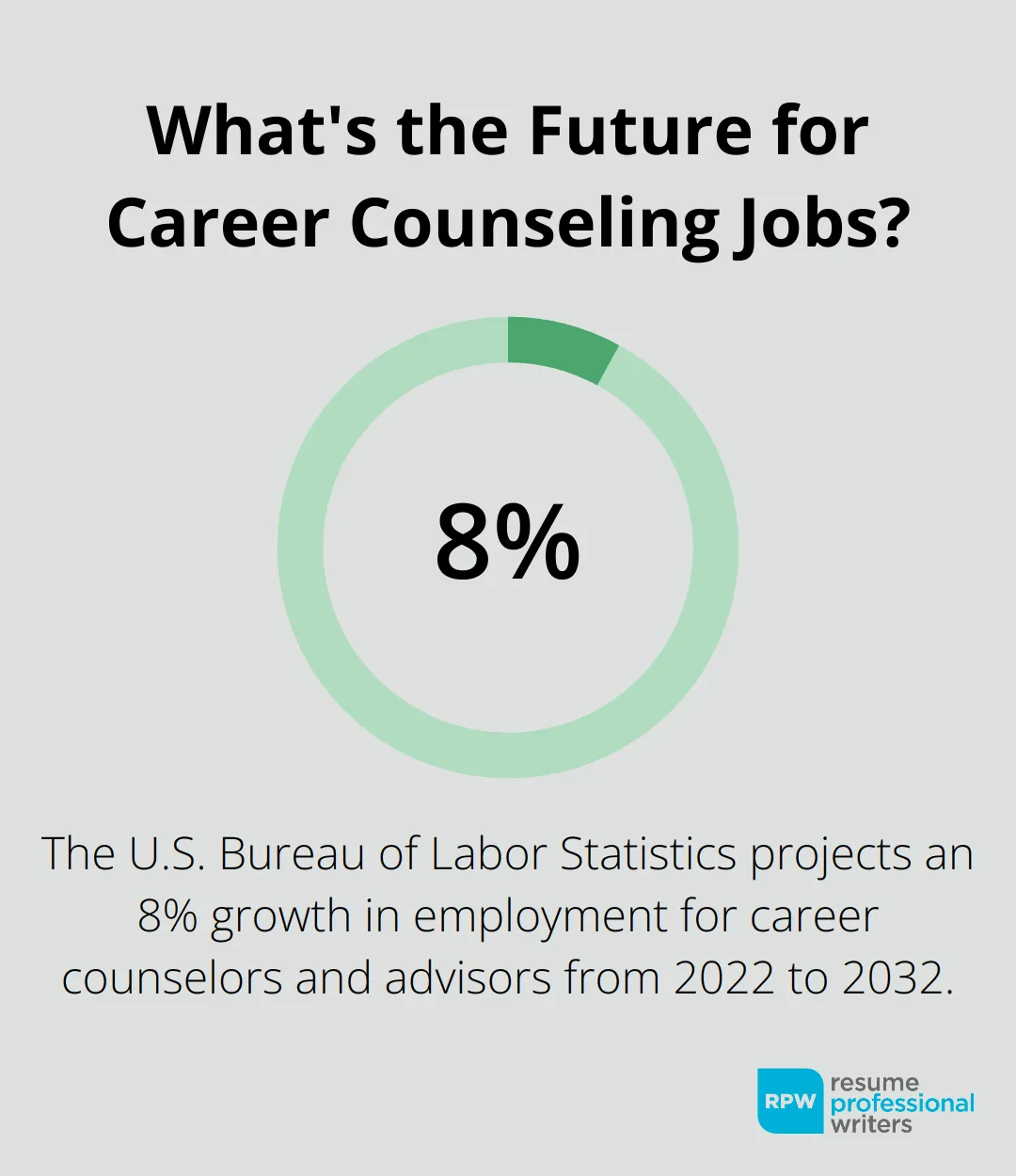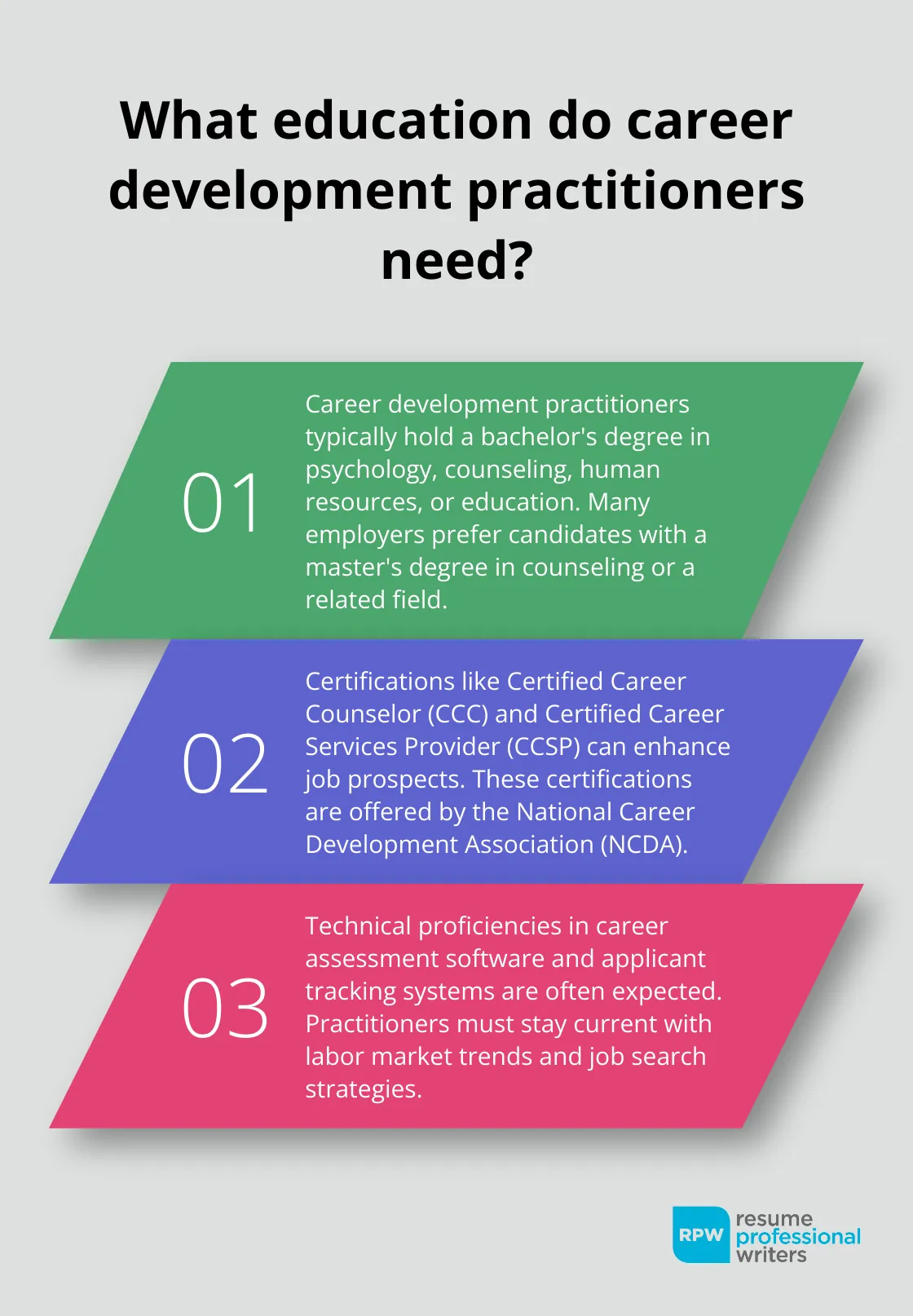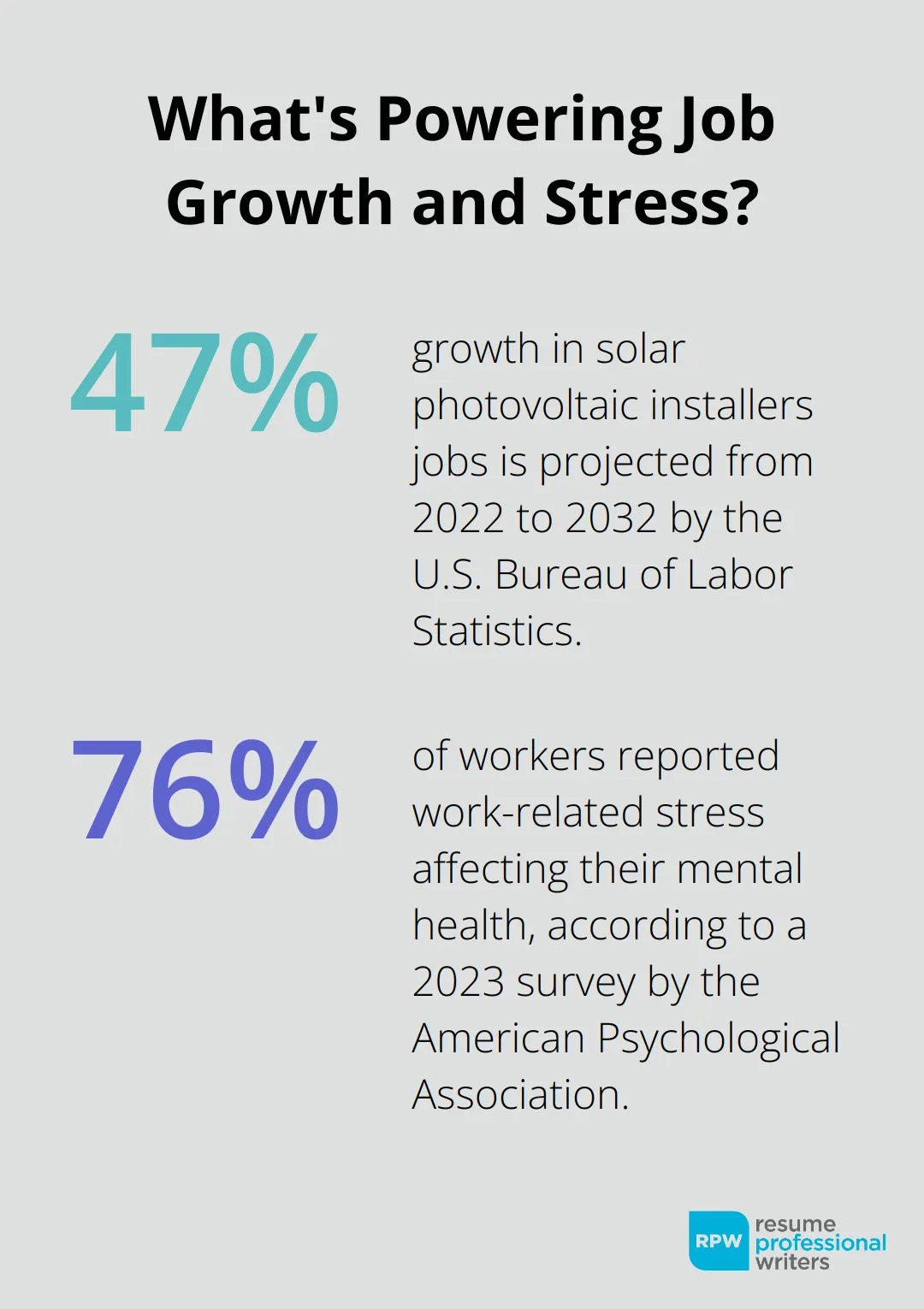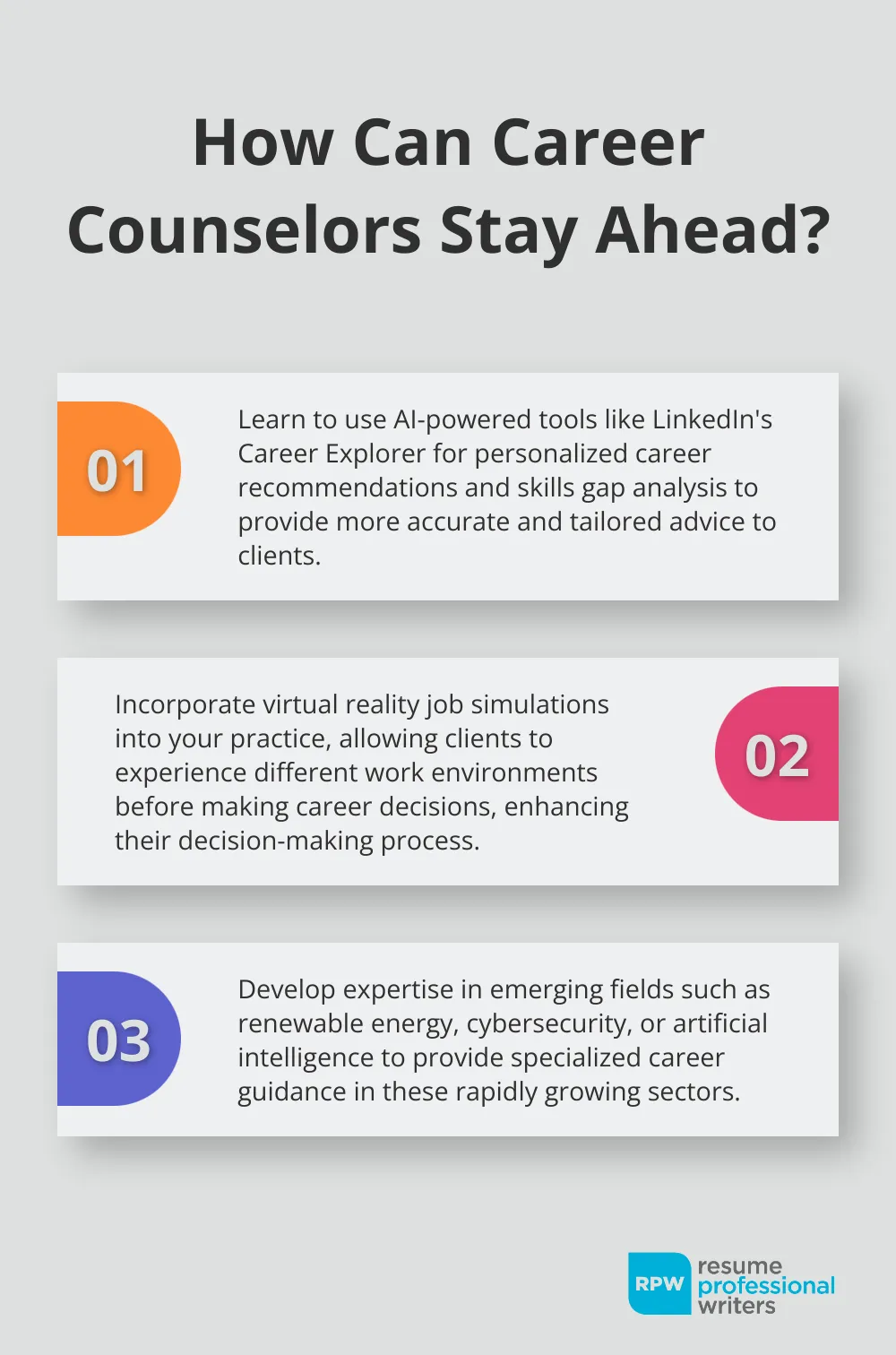We understand the importance of guiding individuals toward fulfilling careers. The role of career development practitioners has become increasingly vital in today’s dynamic job market.
This article examines the current job landscape and future opportunities for Career Development Practitioners. We will discuss the necessary skills, growth potential, and emerging trends that shape this rewarding profession.
The Booming Market for Career Development Practitioners
Rising Demand for Career Guidance Professionals
The career development industry is experiencing unprecedented growth, driven by rapid changes in the job market and increasing demand for professional guidance. The U.S. Bureau of Labor Statistics projects an 8% growth in employment for career counselors and advisors from 2022 to 2032 (faster than the average for all occupations). This growth translates to approximately 33,100 job openings each year over the decade. The increasing complexity of career paths and the need for continuous skill development fuel this demand.
Diverse Employment Opportunities
Career development practitioners find employment in a variety of settings. Educational institutions, particularly colleges and universities, employ many practitioners in career services departments. Government agencies, such as workforce development centers, also offer numerous opportunities. Private sector employers (including outplacement firms and corporate HR departments) increasingly recognize the value of in-house career development professionals.
Emerging Trends Shaping the Field
The rise of remote work creates new opportunities for virtual career counseling. Online platforms and digital tools have become integral to the profession, allowing practitioners to reach a broader audience. Additionally, the gig economy’s growth leads to increased demand for specialists who can guide freelancers and contract workers through their unique career paths.
Impact of Technology on Career Development
Technology transforms the way career development practitioners work. AI-powered tools assist in resume screening and job matching, while virtual reality simulations provide immersive career exploration experiences. Practitioners must adapt to these technological advancements to stay relevant in the field.
Specialization Opportunities
The career development field offers various specialization opportunities. Practitioners can focus on specific industries (such as healthcare or technology), demographic groups (like veterans or recent graduates), or career stages (early career, mid-career transitions, or executive coaching). This specialization allows practitioners to develop deep expertise and cater to niche markets.

As the career development landscape evolves, practitioners must continuously update their skills and knowledge. The next section explores the essential qualifications and competencies required for success in this dynamic field.
Essential Skills for Career Development Practitioners
Educational Foundation
Career development practitioners typically hold a bachelor’s degree in psychology, counseling, human resources, or education. Many employers prefer candidates with a master’s degree in counseling or a related field. The U.S. Bureau of Labor Statistics indicates that advanced education often correlates with higher salaries and expanded job opportunities in this sector.
Key Certifications
While not always mandatory, certifications can significantly enhance job prospects. The National Career Development Association (NCDA) offers several valuable credentials, including the Certified Career Counselor (CCC) and the Certified Career Services Provider (CCSP). These certifications demonstrate expertise and adherence to professional standards.
Technical Proficiencies
Practitioners must stay current with labor market trends, job search strategies, and assessment tools. Proficiency in career assessment software (such as Strong Interest Inventory or Myers-Briggs Type Indicator) is often expected. Familiarity with applicant tracking systems (ATS) and resume optimization techniques proves crucial for guiding clients through modern job application processes.
Interpersonal Abilities
Effective communication stands as a cornerstone skill in this field. Practitioners must excel at active listening, asking probing questions, and providing clear guidance. Empathy and cultural competence are vital, as practitioners work with diverse clients facing various career challenges. Strong organizational skills help manage multiple clients and maintain detailed records of their progress.
Commitment to Professional Growth
The career development landscape evolves rapidly, influenced by technological advancements and shifting economic conditions. Successful practitioners commit to ongoing professional development through workshops, conferences, and staying informed about industry trends. This dedication to learning ensures they provide the most up-to-date and effective guidance to their clients.

As the field of career development continues to evolve, practitioners must adapt their skills and knowledge to meet new challenges. The next section explores the exciting growth opportunities and future outlook for this dynamic profession.
What’s Next for Career Development Practitioners?
Embracing Technology-Driven Career Guidance
Artificial Intelligence (AI) and machine learning revolutionize career development. Practitioners now use AI-powered tools for personalized career recommendations, skills gap analysis, and job market forecasting. LinkedIn’s Career Explorer, for example, uses AI to suggest potential career transitions based on a user’s skills and experience.

Virtual Reality (VR) transforms the field. Some career centers offer VR-based job simulations, allowing clients to experience different work environments before making career decisions. This immersive approach enhances decision-making and reduces the risk of career mismatches.
Specializing in Emerging Fields
New industries create opportunities for career development practitioners to become subject matter experts. Fields like renewable energy, cybersecurity, and artificial intelligence experience rapid growth and require specialized career guidance.
The U.S. Bureau of Labor Statistics projects a 47% growth in solar photovoltaic installer jobs from 2022 to 2032. Career practitioners who specialize in renewable energy careers can provide valuable insights into this booming sector.
Focusing on Holistic Career Wellness
Career development is linked intrinsically to overall well-being. Progressive practitioners incorporate elements of mental health support, work-life balance coaching, and financial wellness into their services.
A 2023 survey by the American Psychological Association found that 76% of workers reported work-related stress affecting their mental health. Career development practitioners who address these concerns alongside traditional career guidance will be in high demand.
Adapting to the Gig Economy
The rise of freelance and contract work necessitates new approaches to career development. Practitioners help clients navigate the complexities of gig work, including personal branding, contract negotiation, and financial planning for variable income.
According to Statista, the number of freelancers in the United States will reach 90.1 million by 2028. This trend underscores the need for career guidance tailored to independent workers.
Leveraging Data Analytics
Career development practitioners use data analytics to inform their guidance. Analysis of labor market trends, salary data, and skills demand allows practitioners to provide more accurate and actionable advice to their clients.
Tools like Burning Glass Technologies analyze millions of job postings to identify emerging skills and career paths. Practitioners who master these analytical tools can offer data-driven insights that set them apart in the field.
How to Thrive in a Transforming Career Development Landscape
Career development practitioner jobs offer a promising future in a rapidly evolving job market. The increasing complexity of career paths and technological advancements create sustained demand for skilled professionals who can navigate these changes. Practitioners who embrace innovations like AI-powered assessment tools and virtual reality job simulations will lead the industry.

The field provides diverse specialization options, allowing professionals to align their work with their interests and strengths. Career development practitioners contribute to a more engaged and productive workforce, adding meaning and purpose to their work. This societal impact makes it an attractive option for those seeking a rewarding career.
We collaborate with career professionals to create resumes that align with current industry standards. Our team of expert writers supports both practitioners and job seekers in their professional journeys. As the demand for career development practitioners grows, we remain committed to providing valuable resources for those navigating the complex world of work.








